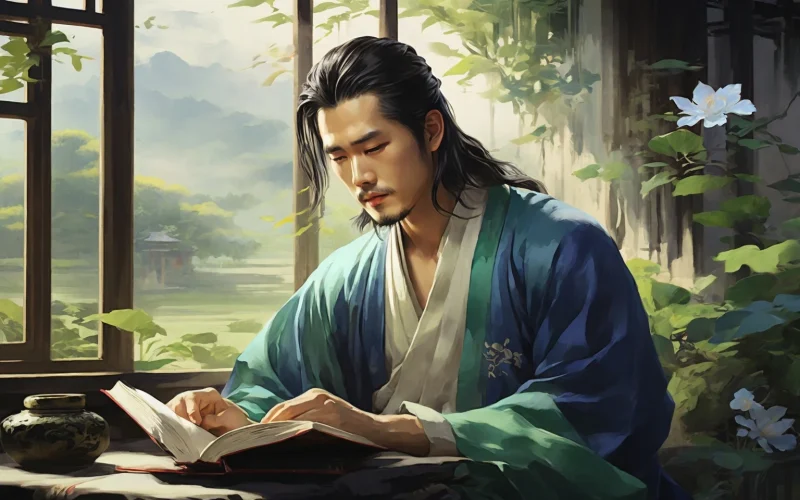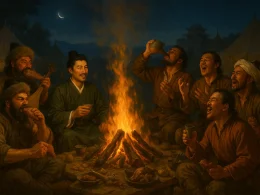Every thing has its resting place;
Alone the cloud’s drifting in vain.
Melting in air, it leaves no trace.
When can we see its glow again?
Morning clouds rise from mist of night,
All birds fly to welcome the day.
One in the woods is late in flight
But early on its homeward way.
I’ll keep to beaten track of yore,
Though from hunger and thirst not free.
There’re no connoisseurs any more.
Why should poverty sadden me?
Original Poem
「咏贫士 · 其一」
陶渊明
万族各有托,孤云独无依。
暧暧空中灭,何时见馀晖。
朝霞开宿雾,众鸟相与飞。
迟迟出林翮,未夕复来归。
量力守故辙,岂不寒与饥?
知音苟不存,已矣何所悲。
Interpretation
This poem was composed by Tao Yuanming after his resignation from officialdom, using the image of a "poor scholar" to express his personal circumstances and ideal character. At a time of political turmoil and frequent dynastic changes, Tao abandoned his official career to return to farming, disdaining glory and wealth while maintaining his noble integrity. This series of seven poems all adopt the persona of a "poor scholar" to articulate the scholar's aspirations, effectively serving as the poet's self-portrayal. The first poem opens with imagery of solitary clouds, morning mist, and returning birds, employing natural symbols to convey human solitude, expressing both his rejection of official life and lament over the difficulty of finding kindred spirits.
First Couplet: "万族各有托,孤云独无依。"
Wàn zú gè yǒu tuō, gū yún dú wú yī.
All creatures under heaven have their place,
Only the lone cloud drifts with no embrace.
The "lone cloud" symbolizes the poet's solitary independence—unattached to power or convention—while also reflecting the impoverished scholar's isolation.
Second Couplet: "暧暧空中灭,何时见馀晖。"
Ài ài kōng zhōng miè, hé shí jiàn yú huī.
Hazy, it vanishes in the sky,
When will its fading light reappear high?
The "fading light" represents hope or ideals; though lonely, the poet still yearns for enlightenment and companionship, while also hinting at life's fleeting brilliance.
Third Couplet: "朝霞开宿雾,众鸟相与飞。"
Zhāo xiá kāi sù wù, zhòng niǎo xiāng yǔ fēi.
Morning rays disperse the nightly haze,
Flocks of birds take flight through the maze.
The natural description carries political undertones—the birds symbolize people chasing glory in the new regime, contrasting the poet's refusal to follow the crowd or curry favor.
Fourth Couplet: "迟迟出林翮,未夕复来归。"
Chí chí chū lín hé, wèi xī fù lái guī.
My slow wings leave the woods late,
Yet return before evening's gate.
"Late to depart, early to return" reflects his unwillingness to strive in officialdom, neither eager to soar nor entangled in politics, content with simplicity.
Fifth Couplet: "量力守故辙,岂不寒与饥?"
Liàng lì shǒu gù zhé, qǐ bù hán yǔ jī?
Measuring my strength, I stay my course,
Yet can I escape cold and hunger's force?
Directly confronting the scholar's hardships, the poet acknowledges his suffering but remains steadfast, emphasizing the difficulty of maintaining integrity.
Sixth Couplet: "知音苟不存,已矣何所悲。"
Zhī yīn gǒu bù cún, yǐ yǐ hé suǒ bēi.
If no kindred soul remains,
Why grieve? Let go of pains.
A moment of emotional transcendence—though aware that true companions are rare and ideals unfulfilled, the poet does not wallow in sorrow. Instead, his resigned "let it be" reflects detachment from worldly concerns, revealing his philosophical serenity.
Holistic Appreciation
"A Poor Scholar I" masterfully blends lyricism and symbolism. Adopting the persona of a poor scholar, Tao Yuanming compares himself to a lone cloud and a slow-flying bird, vividly expressing his aloof independence and unyielding stance. The poem balances clear-eyed reflection on reality with yearning for an ideal companion, ultimately arriving at a state of serene acceptance. The contrast between "flocks of birds taking flight" and "my slow wings returning early" underscores his deliberate isolation and moral steadfastness. The concluding line—"If no kindred soul remains"—captures both resignation and unwavering resolve, embodying a philosophical calm born of solitude.
Artistic Merits
The poem's language is simple yet profound, with a restrained tone that reveals deep wisdom. Tao skillfully employs natural imagery—"lone cloud," "fading light," "morning mist," "returning birds"—to convey emotion and ideals, embedding meaning within symbols. Contrasts run throughout: flocks versus solitude, eager flight versus early return, emphasizing the poet's noble defiance. The emotional arc moves from loneliness to longing, then resolves in tranquil acceptance, reflecting spiritual self-sufficiency.
Insights
This poem teaches that in times of chaos and shifting loyalties, staying true to oneself is the highest virtue. Solitude is not to be feared—only the loss of integrity is. Through the "impoverished scholar," Tao Yuanming expresses disdain for worldly power and commitment to moral ideals. Even without kindred spirits, one should embrace solitude with dignity. This "unyielding independence" remains a vital attitude in our own restless age.
Poem translator
Xu Yuanchong (许渊冲)
About the poet

Tao Yuanming(陶渊明), 365 – 427 CE, was a poet, literary figure, fu writer, and essayist active during the late Eastern Jin and early Liu Song dynasties. Born in Chaisang (near present-day Jiujiang, Jiangxi Province), he pioneered a new genre of pastoral-themed literature, expressing profound philosophical insights through simple language. His poetic style became an enduring aesthetic standard in classical Chinese poetry.












